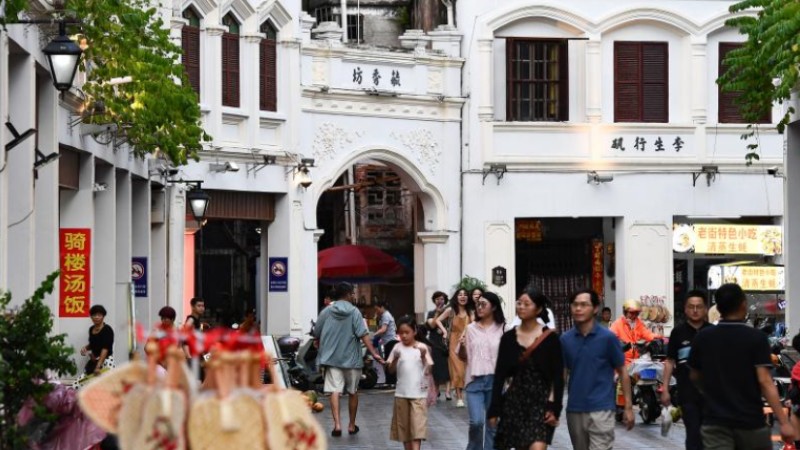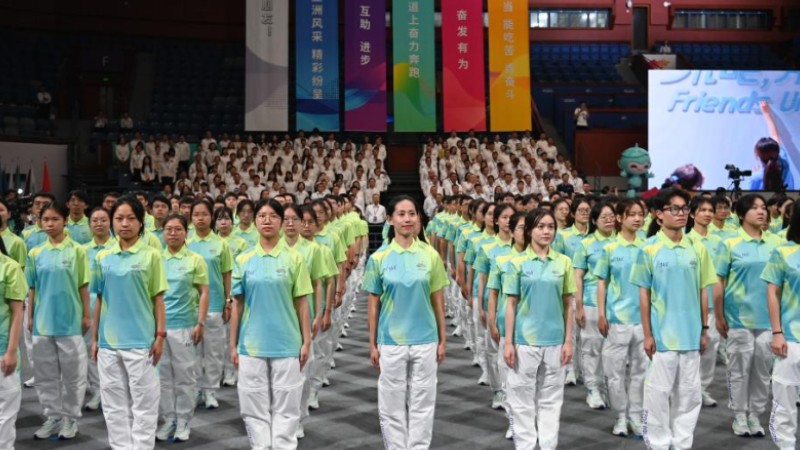Xi's initiative helping solve grassroots problems, address complaints

Salvage workers remove trash from the Tongle section of the Puyang River in Pujiang county, Jinhua city, Zhejiang province, in March. XU YU/XINHUA
Visit to Pujiang county 20 years ago paved way for villagers' regular meetings with officials
For the past 20 years, officials in Pujiang county, Zhejiang province, have been routinely visiting villages and communities to listen to and solve people's problems.
Without the need to make an appointment, villagers can raise any issue that is bothering them with the officials when they visit the village on the 15th of each month.
The officials sometimes come to the village before that date if residents feel their issues are particularly urgent, said Zhu Yutang, who comes from Xingguang village.
The 74-year-old added: "We are so used to seeing the Party chief or county head here in the village. What's important for us is that they aren't just here for show. The villagers know the officials can provide solutions on the spot."
Zhu said that as the officials make regular visits, residents no longer need to leave the village to raise their concerns. At the same time, the officials gain a clear picture of the issues that are worrying people the most.
"Having officials visit villages to solve people's problems may be a common practice in Pujiang now, but 20 years ago, such a breakthrough was made when filing petitions to a higher authority was the best way for villagers to make the local government take their problems seriously," Zhu said.
That breakthrough, known as the "Pujiang experience", was made by President Xi Jinping, who at the time was secretary of the Communist Party of China Zhejiang provincial committee. The practice has helped the county cut the number of public complaints filed by letter or in person from 10,307 in 2002 to 629 last year.
In the book Zhejiang, China: A New Vision of Development, which contains essays written by Xi for a column in Zhejiang Daily, a local newspaper, he writes that reaching out to people and helping them solve their problems is the duty and responsibility of officials. Resolving social disputes from the roots is also key to promoting social harmony and stability.
On Sept 8, 2003, a notice placed on the front page of Pujiang News attracted the attention of people in the county. It stated that provincial leaders would visit Pujiang in the middle of that month to handle people's complaints and petitions.
Zhang Guoqiang, former head of the Pujiang Bureau of Letters and Visits, said the visit immediately became the most discussed topic in the county, as it was commonplace for people to bring issues to higher authorities, such as county or provincial governments, but such authorities never came to villages to hear complaints.
A series of new social problems began to emerge and escalate in Pujiang after China started to reform and enter a phase of fast development, Zhang said.
He added that because local people are very outspoken, Pujiang was well known in Zhejiang for the number of public complaints that had to be tackled.
"The number of xinfang cases in the county rose for 10 consecutive years after 1992 when issues directly affecting people's personal interests surfaced during renovation of old neighborhoods, the restructuring of State-owned enterprises, or relocation projects to make way for reservoirs," Zhang said.
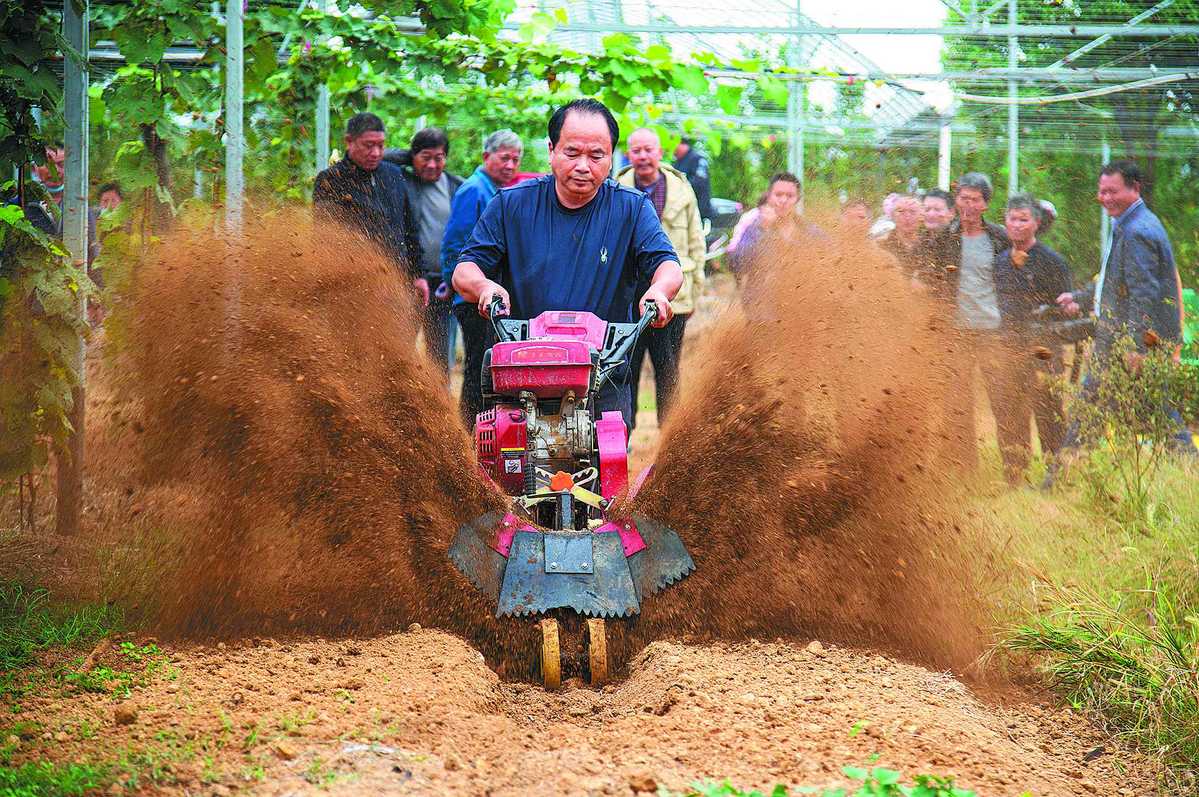
A farmer in Pujiang demonstrates the use of a ditch-digging machine. HU XIAOFEI/FOR CHINA DAILY
Xinfang, which translates as "letters and visits", is a petitioning system unique to China that allows people to lodge complaints with the authorities and seek redress for wrongs, flaws and inefficiencies.
Zhang said, "Although the notice made people realize just how determined and sincere provincial officials were in solving their problems, most of them didn't expect to see Xi in person."
He added that two other notices were placed in Pujiang News on Sept 10 and 15, 2003, informing the public where and when they could meet the officials. To prepare for visits from potentially a large number of people, temporary reception rooms were set up in classrooms at a high school.
As promised, Xi led more than 100 officials from different sectors to Pujiang on Sept 18 that year and launched his innovative reform plan for handling public complaints by encouraging officials to reach out to people and address their concerns.
Jiang Xingjian, owner of a wood processing factory, was the first to meet Xi. He told him urgent repairs were needed to the Pujiang section of Highway S20 (now Highway S210).
"I told Xi that the road, which was built in the 1950s, had become a source of significant traffic safety concerns. It was causing great inconvenience for local people and impeding economic development in mountainous areas. Residents had been complaining about it for many years," Jiang said.
Xi listened carefully, checked the route on a map, and discussed about solutions with a transportation official in the room, Jiang said.

A visitor takes photographs in Shanghe in September. HU XIAOFEI/FOR CHINA DAILY
"He then said that a road that would bring prosperity to local people must be built well, before setting a date for the renovation project. The whole process took less than half hour," Jiang said.
"Before I met Xi, my aim was to simply let him know how badly people wanted to see the road repaired. I never imagined that the problem would be solved on the spot."
After the repairs were made, a 13-kilometer section of treacherous mountain road was transformed into a two-way highway stretching for about 6 km with four lanes, significantly reducing local people's journey times. The road has often been referred to as "Jinping Road "by locals ever since.
On that day, Xi and other officials received complaints from 667 people and solved 91 problems. After meeting the public, Xi said most people's problems are caused by social development. Officials, especially those in key posts, must be encouraged to reach out to people and take their problems seriously, no matter how trivial they may seem, Zhejiang Daily reported on Sept 20, 2003.
Jiang said: "'Jinping Road' is just one of the legacies of Xi's visit to Pujiang. What's more important is that it made local officials understand the need to solve people's problems proactively, instead of passing the buck to someone else."
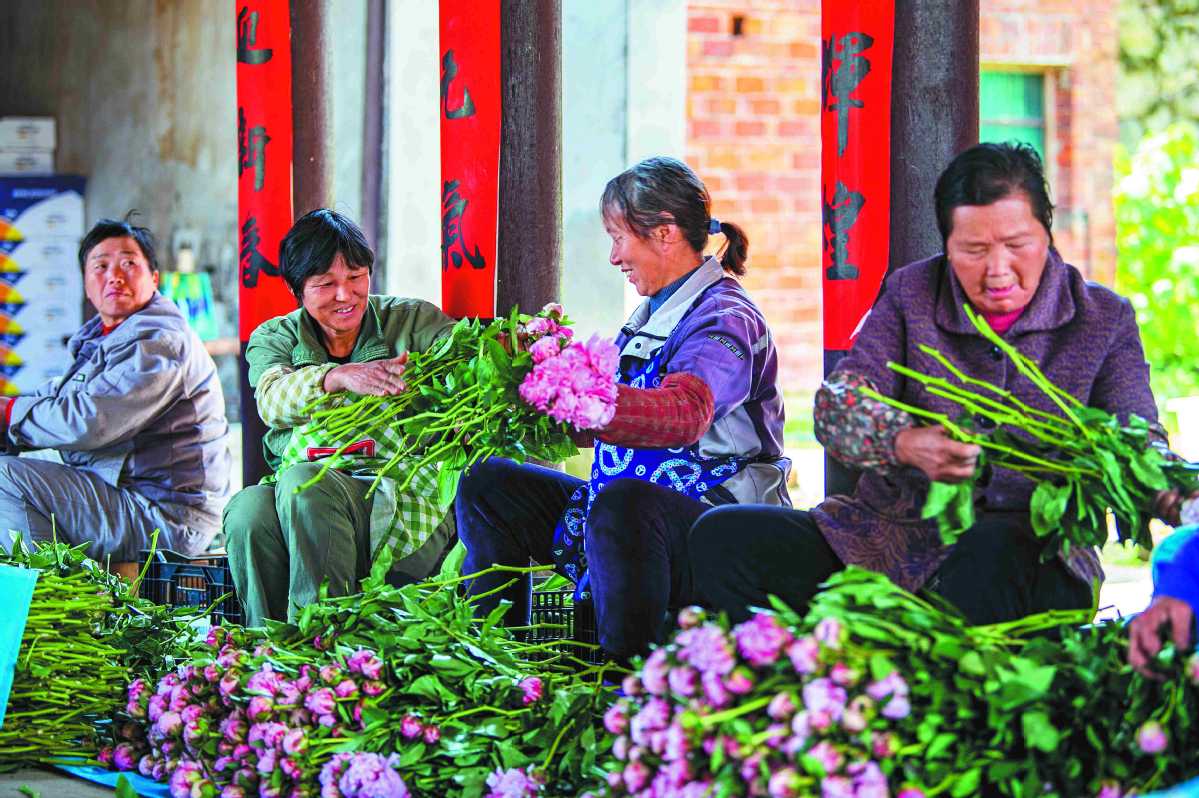
Villagers arrange freshly gathered peonies in Hangping, Pujiang, in May. HU XIAOFEI/FOR CHINA DAILY
Important practice
Yu Zhaofei, dean of Hangzhou Normal University's Shen Junru Law School, said introducing the "Pujiang experience" was an important practice to achieve modern governance, which must be continuously improved to support China's development.
"As a country with a large population, China must find ways to solve social problems at the lowest cost, which can benefit the people and governments at all levels," Yu said.
He added that people in the West need to understand that many disputes and problems at grassroots level in China cannot be tackled by litigations, because they are often caused by different understandings of customs or traditions, which are highly valued by local communities, especially in rural areas.
As a result, numerous problems cannot be filed as court cases. And even if they can, many people may not be able to afford the cost of lawyers and time-consuming court hearings, which will result in social injustice that is often seen in the West. In view of this, China has created ways other than the legal system to resolve nonjudicial cases, including the petition system and introducing the "Pujiang experience", Yu said.
"Social issues in China need to be tackled with Chinese wisdom, and construction of the nation's social governance system must take the traditional and modern aspects of the country into consideration," Yu said. "Simply copying practices from the West won't work."
He added that by having officials from higher authorities who understand the law and government policies meet the people and act as mediators, many disputes can be resolved easily at grassroots level. More important, by working out solutions together, the public and officials become involved in social governance.
Many officials in Pujiang said each face-to-face session with local people is like taking part in a quiz, as they never know what kind of issues will be raised.
The officials always aim to help the people by providing solutions to their problems, whether they be disputes over the use of land, or complaints about the behavior of other villagers.
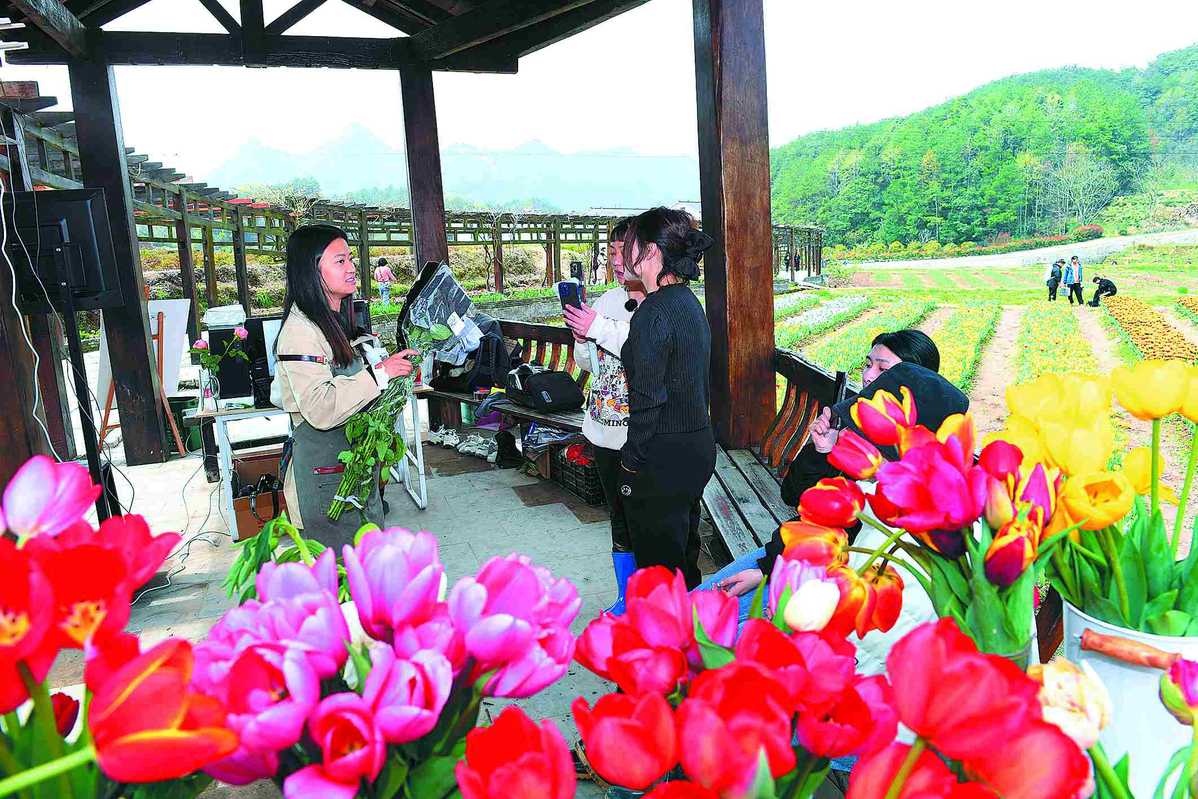
Employees from a flower company stage a livestreaming broadcast in Hangping town, Pujiang. WENG XINYANG/XINHUA
Vital role
Chen Qingsong, Party chief of Hangping township, Pujiang, said the monthly sessions have helped officials understand that solving people's problems is an important part of their routine work.
"There will always be new problems and issues that concern the villagers as China continues to develop, but we can always find ways to address them so that there is nothing to be afraid of. What matters is that we are there for the people," Chen said.
In Zhejiang, China: A New Vision of Development, Xi states that by reaching out to the public, officials not only help solve people's problems, but also gain insight into social development and obtain the skills needed to push for reform and development. Furthermore, the officials are reminded that they are there to serve the public, so the practice brings a number of benefits.
As the "Pujiang experience" has proven effective in preventing problems at grassroots level from escalating, and helped officials to promptly adjust government policies based on people's needs, the practice has been adopted by governments across Zhejiang and China.
Furthermore, a revision made to the Regulation on Letters and Visits last year states that officials are required to regularly visit people in villages and local communities to solve their problems.
Since 2003, officials at county, city and provincial levels in Zhejiang have met with the people about 700,000 times during their visits and helped solve more than 200,000 problems. The public's satisfaction rate with these visits is about 85 percent, the provincial government said in May.
Wang Yongjun, deputy Party chief of Huangyan district in Taizhou city, Zhejiang, said that sitting in an office and reading case files is never the best way to gain an insight into people's complaints and thoughts. Face-to-face communication is the most efficient way to gain a clear picture of the situation and gain the public's trust.
"As long as people's arguments are reasonable, we will try our best to work out a solution that is favorable to them. If their requests are unreasonable, we will explain to them in detail why such requests will be denied. If we find that illegal actions are involved, we will crack down on them in accordance with the law," Wang said.
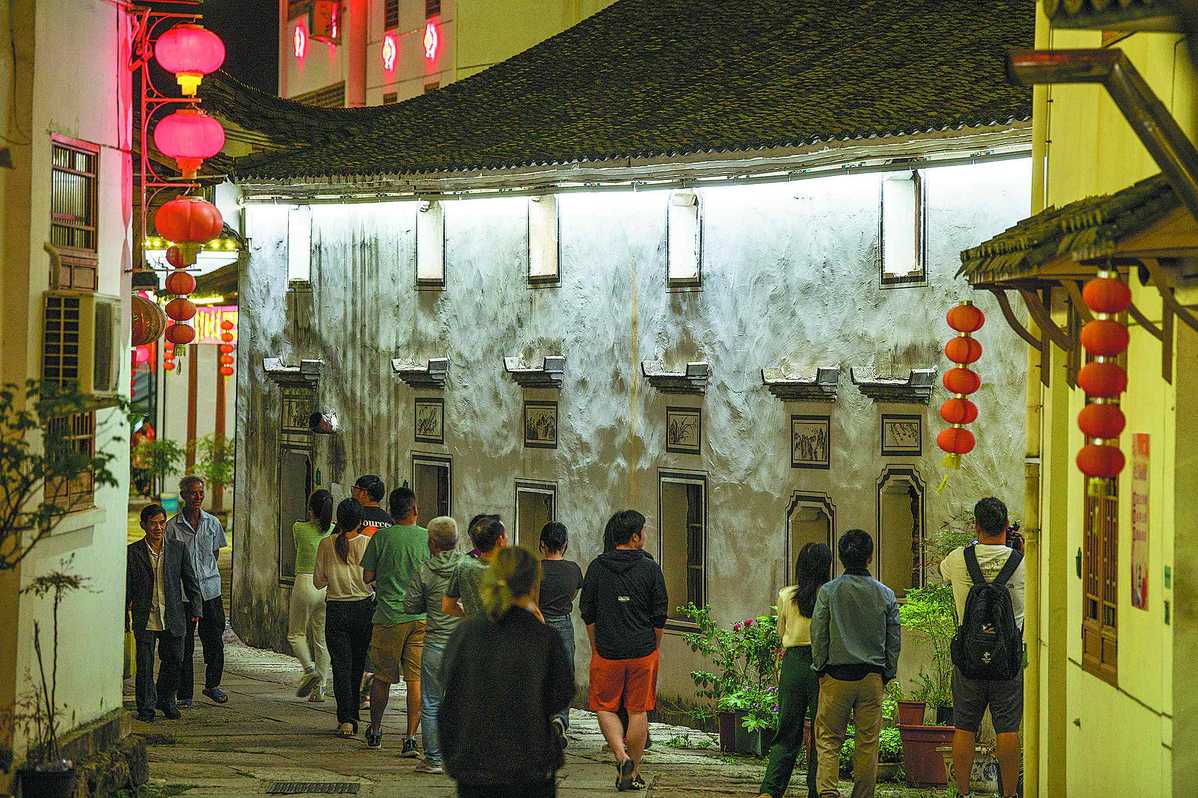
Tourists take an evening stroll in Shanghe village, Pujiang, in September. HU XIAOFEI/FOR CHINA DAILY
"While providing people with solutions to their satisfaction, we also want the public to know that the government is trustworthy and that governance is based on the law," he added.
Zhu Yutang, who comes from Xingguang village, said drawing the authorities' attention to people's problems and disputes has become much easier. In addition to directly communicating with officials, complaints can now be filed via many channels, including government hotlines and social media platforms. People can also take complaints to staff members at social conflict and dispute mediation and resolution centers, he said.
Such a center in the Pujiang county seat offers residents one-stop services for solving their problems. They can meet staff members at counters operated by key government departments such as land resources, healthcare, social security, and environmental protection. Lawyers are also on duty to provide legal aid.
Chen Huang, a staff member at the county construction bureau, has worked at the center for about a year — offering advice on simple cases, and directly informing the bureau's officials about cases that are more complicated.
"In the past, we had to wait for cases to be referred to us via channels for collecting public complaints. Establishing the center has cut out the "middlemen" and significantly reduced the time taken for people to receive feedback," Chen said. "Most of the cases I handle are quite complicated, because an increasing number of problems are being solved at village and township level."
Currently, about 90 percent of public complaints in Pujiang can be resolved in the villages and townships, while only 10 percent of the cases need to be brought to county-level authorities.
To better address the public's needs, from June 10, key Pujiang government officials started taking turns to receive visits from people during weekends. Conflict and dispute mediation and resolution centers have also been set up in all county-level administrative areas in Zhejiang.
Yu, from Hangzhou Normal University, said, "In creating more channels for people to lodge their complaints, and having officials on hand to address the public's concerns on their doorstep, China can tackle social problems more effectively.
"More important, people can gain a stronger sense that the government and Party officials are there to serve them, which is key to political stability and social harmony."
Ma Zhenhuan contributed to this story.
Photos
Related Stories
- China publishes higher education textbook on Xi thought
- Xi calls for efforts to build a beautiful Xinjiang
- Visit marks progress to fairer world
- Xi stresses greater efforts to build beautiful Xinjiang in pursuing Chinese modernization
- Full Text: Remarks by Chinese President Xi Jinping at China-Africa Leaders' Dialogue
- Xi's visit enhances China-Africa traditional friendship, builds new consensus on South-South cooperation
- Xi returns to China after 15th BRICS Summit, state visit to South Africa
- Xi urges int'l community to refocus on development issues
- Xi says China always member of developing world
- Xi calls for refocusing on issue of development
Copyright © 2023 People's Daily Online. All Rights Reserved.






